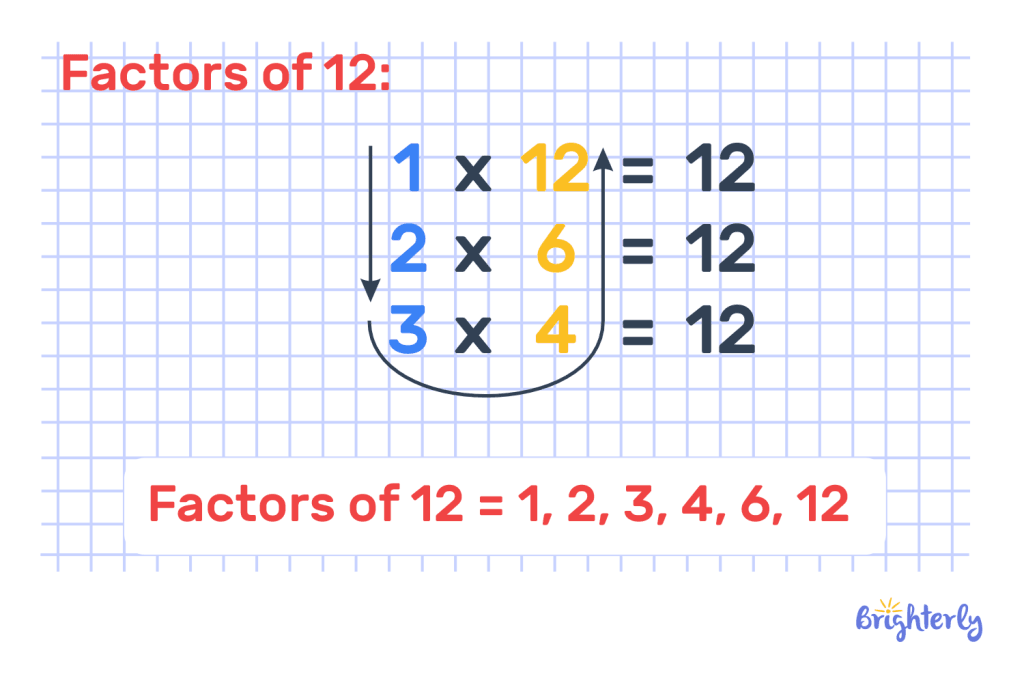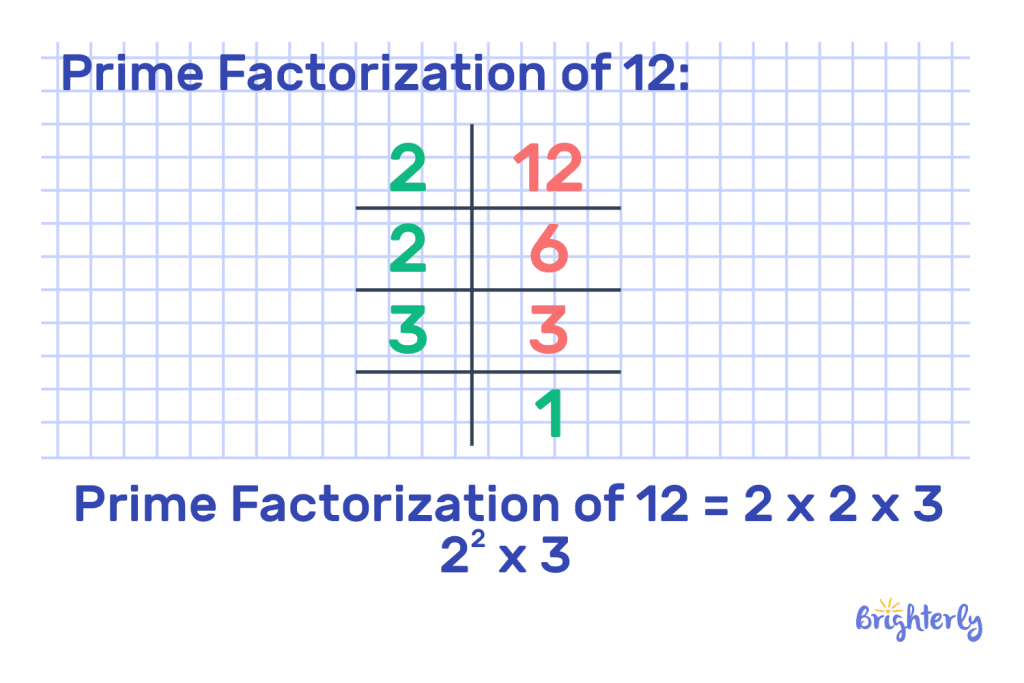Factors of 12 – Definition With Examples
reviewed by Florence Khitsane
Updated on October 28, 2025
With the exception of 0, all whole numbers have factors. These numbers can be multiplied to get to your chosen number, which is why factors can help you solve multiplication and division problems.
At the Brighterly knowledge base, you’ll explore all aspects of the factors of 12. Specifically, we’ll include the list the factors of 12, the definition of factors, and the properties of 12 and its factors. We’ll also share practice problems to help you test your new knowledge!
What are factors of 12?
Factors of 12 are whole numbers that can be multiplied by other whole numbers to get 12 with no remainders. All factors of 12 are as follows:
- 1
- 2
- 3
- 4
- 6
- 12

Definition of factors
The definition of factors is numbers that can be multiplied to fit into another number with no remainder. Both numbers must be whole for it to be considered a factor. Factors are key to multiplication tables, as well as more complex topics like primary factorization.
What makes 12?
To get numbers that make 12, we must look at its factor pairs of 12 – numbers that can be combined to make 12:
- 1 x 12
- 2 x 6
- 3 x 4
Properties of factors
All factors share properties that make them unique:
- All whole numbers have at least 2 factors: 1 and itself
- All factors are lower in value than the number itself
- If number x is a factor of y, and y is a factor of number z, then x is also a factor of z
Properties of the number 12
There are a number of properties that relate specifically to the number 12:
- It’s an even number
- It’s divisible by 1, 2, 3, 4, 6, and 12, which are also its factors
- Its two digits (1 + 2) add to 3, so it’s divisible by 3
- The above property means it’s a Harshad number
Properties of the factors of 12
Each factor of 12 has its own unique properties, too! So, what are the factors of 12 and their properties?
- 1 – a factor of all numbers (aka the multiplicative identity)
- 2 – the smallest even prime number
- 3 – the second prime factor of 12
- 4 – a square number
- 6 – the smallest perfect number after 1
- 12 – only needs to be multiplied by 1
Difference between prime and composite factors
The difference between prime and composite factors is how many factors they have themselves. Prime factors only have 2 factors – themselves and 1. Composite factors, however, contain more factors within them. In terms of the factors of 12:
- 2 and 3 are prime factors
- 4 and 6 are composite factors

You might also be wondering, “Is 12 a prime number?” The answer is no, because it has multiple factors.
Listing factors of 12
Here’s a step-by-step guide to listing the factors 12:
- First, start with the number 1. You multiply 1 by 12 to get 12, so this is a factor
- Next, move to number 2 and see if you can multiply it by another number to get 12 – here, you multiply it by 6
- Repeat with all your numbers up to 6, because a number larger than half of your number cannot be a factor. You’ll see 3 multiplied by 4 – that’s all your factors!
This is how you work out what is the factor of 12.
Practice problems on finding the factors of 12
Now it’s time to test yourself out. Here are some practice questions – use your newfound knowledge to solve these puzzles.
- You have 12 chocolates to share among your 4 friends. How many chocolates does each friend get?
- Identify the number that is not a factor of 12: 3, 5, 6
- Identify the prime factors of 12 and show your workings – how do you know this?
Conclusion
Here, we’ve covered what’s the factor of 12. and how you can identify them. This is key knowledge that will help you with your times tables and future learning, like prime factorization.
Go forth and apply your new knowledge to your math class – you’ll be sure to impress both your friends and your teacher!
Frequently asked questions on factors of 12
What is a factor of 12?
The factors of 12 are 1, 2, 3, 4, 6, and 12 — these are all the numbers divisible by 12 with no remainder. If you’re wondering, “Is 3 a factor of 12?”, the answer is yes!
What are the prime factors of 12?
The prime factors of 12 are 1, 2, and 3. This is because these numbers only have 2 factors: themselves and 1. The other factors for 12 – 4 and 6 – have additional factors, making them composite factors.
Is 12 a prime number?
No, 12 is not a prime number. A prime number is only divisible by itself and 1, meaning they are its factors. 12, meanwhile, has additional factors including 2, 3, 4, and 6, meaning it’s a composite factor.
How many factors does 12 have?
12 has 6 factors in total: they are 1, 2, 3, 4, 6, and 12. This is how many numbers can be multiplied to fit into 12 with no remainders.
What are all the factors of 12?
All the factors of 12 are:
- 1
- 2
- 3
- 4
- 6
- 12
To further your knowledge, the prime factorization of 12 is 22 × 3. You find this by dividing 12 by its smallest prime factor, which is 2. You get 6, so divide that by 2 again. Then you’re left with 3, which can only be divided by 1.






